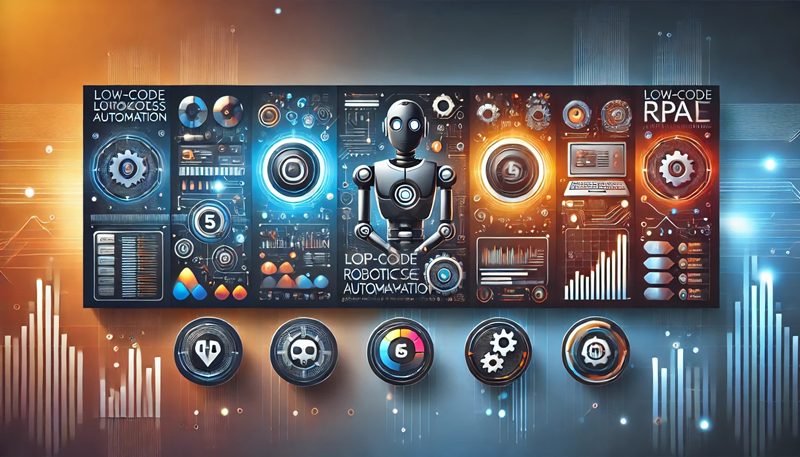Robotic Process Automation (RPA) has transformed business operations, automating repetitive tasks and improving efficiency across industries. The rise of low-code RPA platforms has made it even easier for businesses to implement automation without extensive coding expertise. This guide highlights the top 5 low-code RPA platforms revolutionizing business processes in 2025.
1. UiPath: The Leading Low-Code RPA Platform
Why UiPath is a Market Leader:
UiPath is a top choice for businesses seeking powerful and scalable automation solutions. With its low-code design, it caters to both technical and non-technical users.
Key Features:
- Drag-and-drop workflow builder
- AI-driven automation capabilities
- Pre-built templates for common use cases
Best For: Enterprises looking for end-to-end automation across departments.
Trending Use Cases:
- Invoice processing automation
- HR onboarding workflows
- Customer support chatbots
2. Automation Anywhere: Simplified RPA for Businesses
What Makes Automation Anywhere Stand Out:
Automation Anywhere offers a robust low-code RPA platform with a focus on scalability and intelligent automation.
Key Features:
- Intuitive bot creation with drag-and-drop functionality
- AI and ML integration for cognitive automation
- Cloud-native architecture for flexibility
Best For: Businesses aiming to scale their automation efforts globally.
Trending Use Cases:
- Data entry and reconciliation
- Automated report generation
- Workflow optimization in supply chains
3. Microsoft Power Automate: Low-Code RPA with Seamless Integration
Why Microsoft Power Automate is a Game-Changer:
Microsoft Power Automate allows businesses to create automated workflows with ease, leveraging its deep integration with the Microsoft ecosystem.
Key Features:
- Pre-built connectors for Microsoft Office and Dynamics 365
- AI Builder for document processing and analysis
- Cloud and desktop automation options
Best For: Organizations already using Microsoft products seeking seamless automation.
Trending Use Cases:
- Email and task automation
- Streamlining approvals and notifications
- Data synchronization across systems
4. Blue Prism: Enterprise-Grade Low-Code RPA
Why Blue Prism is Trusted by Enterprises:
Blue Prism is known for its secure, enterprise-grade RPA solutions. Its low-code approach enables businesses to automate complex processes efficiently.
Key Features:
- Visual process design for ease of use
- Advanced analytics and reporting tools
- Integration with AI services like Google and IBM Watson
Best For: Large enterprises with strict security and compliance requirements.
Trending Use Cases:
- Regulatory compliance automation
- Customer onboarding processes
- Fraud detection workflows
5. Nintex RPA: Streamlining Business Processes
What Sets Nintex RPA Apart:
Nintex RPA provides a user-friendly platform for automating business processes, focusing on simplicity and speed.
Key Features:
- Low-code bot creation with visual tools
- Pre-configured templates for various industries
- Seamless integration with Nintex Workflow Cloud
Best For: Small and medium-sized businesses looking for cost-effective automation.
Trending Use Cases:
- Accounts payable automation
- Document processing and management
- Employee onboarding tasks
Benefits of Low-Code RPA Platforms for Business
Why Businesses Are Adopting Low-Code RPA:
Low-code RPA platforms offer several advantages that make automation accessible and efficient:
- Ease of Use: Drag-and-drop interfaces simplify bot creation.
- Faster Implementation: Deploy automation workflows in weeks, not months.
- Cost Efficiency: Reduce development costs with low-code tools.
- Scalability: Adapt to growing business needs with flexible solutions.
How to Choose the Right Low-Code RPA Platform
When selecting a low-code RPA platform, consider these factors:
- Ease of Integration: Ensure compatibility with your existing systems.
- Scalability: Look for platforms that can grow with your business.
- AI and ML Capabilities: Leverage intelligent automation for complex tasks.
- User Support: Evaluate the quality of training and resources provided.
These top 5 low-code RPA platforms are empowering businesses to embrace automation and improve efficiency without extensive coding expertise. Whether you’re a small business or a large enterprise, these tools offer the flexibility and scalability needed to streamline your processes and stay competitive in 2025.
